
Cycle Rajasthan Itinerary
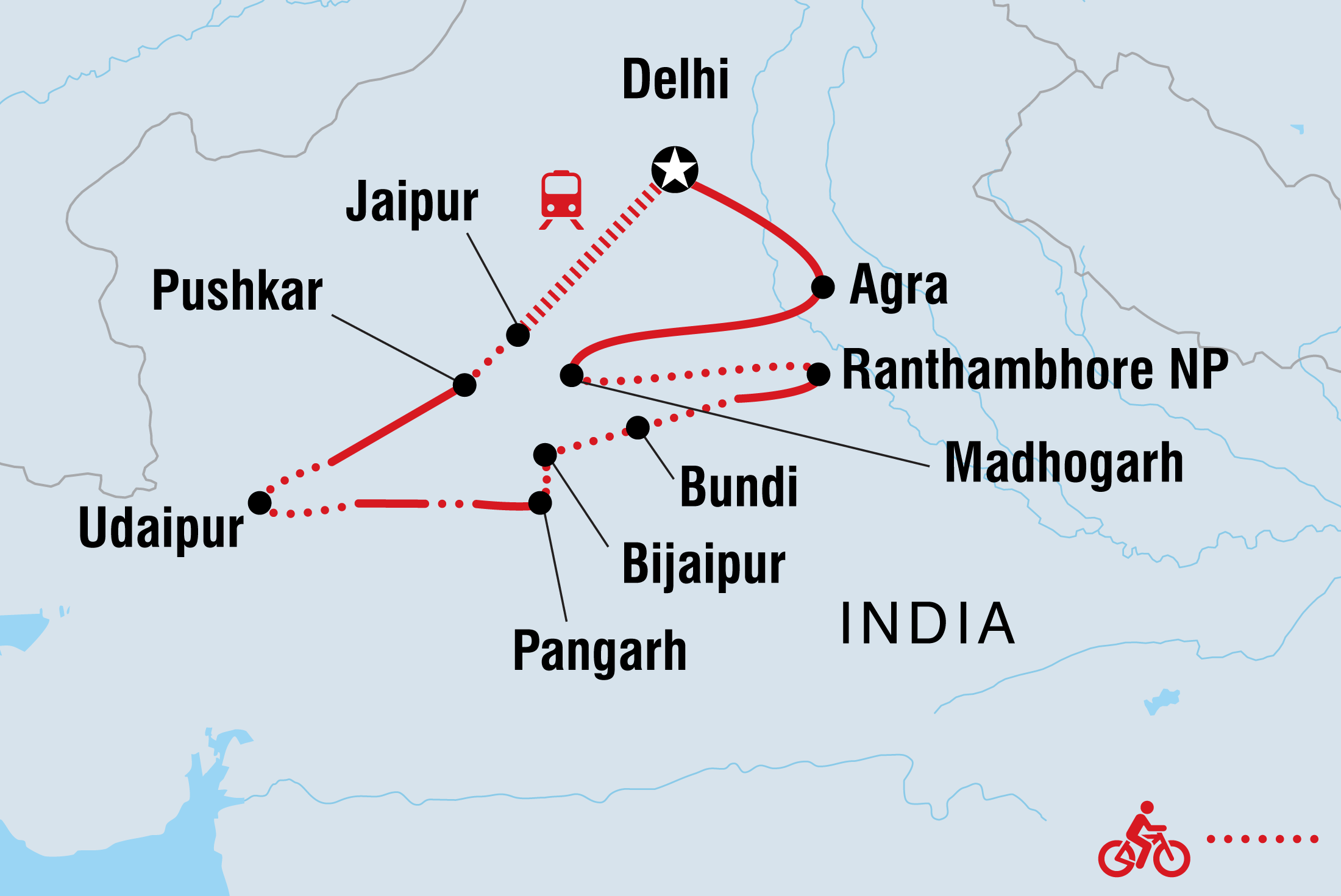


Namaste! Welcome to India. Your adventure begins in Delhi with a welcome meeting at 6 pm tonight. If you arrive early, there are plenty of things to see and do –maybe visit the World Heritage-listed Humayun's Tomb or the 12th-century Qutub Minar. As the former residence of royal families and British soldiers, the Red Fort plays a vital part in Delhi’s history and is must-see when you’re here. You could also book an Urban Adventure to see Delhi through the eyes of a local. After you meet your fellow travellers and trip leader, you’ll meet your cycling crew and get fitted out for your bike – then, you have free time to grab an optional group dinner and get to know each other a little better.
Today starts on the bike with an early morning warm-up ride. For the rest of the day, you’ll take a tour through the main sights of Delhi in a private vehicle. Explore 2000-year-old Old Delhi and visit the Jama Masjid – Delhi's oldest and India’s largest mosque. Then, head to the Sikh temple of Sheeshganj Gurudwara and India Gate – the latter commemorating soldiers who lost their lives fighting for the British Indian Army in World War I. In the late afternoon, take a train journey to Jaipur – the ‘Pink City’ and the capital of Rajasthan. Tonight, you’re free to find a good spot to feast on the delicious local cuisine – your leader will know all the best spots!
This morning, explore the ‘Pink City’ of Jaipur by private vehicle and on foot. Visit the Amber Fort – set atop a hill that overlooks Maota Lake, the fort is a gorgeous example of Rajput architecture. Entering the Sheesh Mahal (Hall of Mirrors) is a particularly memorable experience. You’ll also have the option to visit Jaipur's Royal City Palace and/or one of the five astronomical observatories built by the founder – Jaipur Maharaja Jai Singh. At the end of the day, you might like to sit back in the iconic Raj Mandir Cinema and enjoy a Bollywood blockbuster.
Depart Jaipur after breakfast and after a short drive to beat the traffic mount your bike for a ride from the town of Naraiana. On the way, you’ll pass several forts and make a few stops for photo ops. When you arrive, you’ll drive the last leg to the sacred city of Pushkar. Tonight, head out on a guided walk around the town. Pass the holy Pushkar Lake, where pilgrims come to cleanse themselves of sins and disease by bathing along the lake’s 52 ghats. As the most important temple of its kind, a visit to Brahma Mandir is also a must – this is one of India’s few temples dedicated to the Hindu creator Brahma. The main street of the town is a bustling tourist market and in your free time, you might like to take a stroll around or hunt for a few souvenirs to take home.
Spend the day cycling half the way to the ‘White City’ of Udaipur.You’ll ride on small, quiet roads that roll through red soil, fields and small farms, stopping in Beawar. Hop in the support vehicle for the rest of the journey. Known as the ‘Venice of the East’, Udaipur is often regarded as the most romantic city in India. Set amid the Aravalli Hills, the city curls around Lake Pichola, the two palaces of Jag Mandir and Jag Nivas rising out of the water in their own reflections. When you arrive, soak away the days activities and rest at your accommodation.
Spend the day touring the sights of Udaipur with the group today. You’ll wind through narrow streets to the City Palace complex on the banks of Lake Pichola, which is the largest palace in Rajasthan. Pop into the impressive Jagdish Temple, dedicated to the Lord Vishnu. If time permits, maybe visit the rose gardens of the Gulab Bagh, take a boat trip across Lake Pichola or participate in a Sitar lesson.
Start your day with a bike ride through the Chittorgarh countryside, before boarding the support vehicle for the last stretch to Chittaurgarh. When you arrive, you’ll climb back on the bikes and cycle through the hills towards Bijaipur. From here, you’ll avoid the main highway and head south to Pangarh Lake. Tonight, your group will spend the night in a comfortable permanent tent camp. When you arrive, unwind with a steaming cup of chai tea and watch the sunset over the lake and the serene Vindhya Range. Soak up the views of the 15th-century Pangarh Fort in the distance, perched on the hill to the north and swap stories with your fellow travellers.
This morning, say goodbye to the campsite and cycle through farmlands to the village of Bijaipur. On the way, you’ll witness local rural life in action and, depending on the season, opium poppy fields in harvest. In Bijaipur, you’ll stay in the 16th-century Castle Bijaipur, which is now a heritage hotel within the original fortified walls. Enjoy the palace’s blend of modern and Mughal architecture as you relax by the pool or in the gardens, pampered by the Mewar hospitality of the hotel’s owners.
After breakfast, cycle the rural roads to the town of Ratangarh . From here take the van to Bundi – one of the most popular tourist destinations in Rajasthan, famous for its intricate architecture, cultural heritage and rich history. When you arrive, you’ll explore the town on a leader-led walking tour. Wander the narrow streets packed with blue Brahmin houses, bazaars, temples and shops, and mingle with locals in the downtown market. Visit Bundi’s ancient and ornately carved baoris (step wells), which once provided water to the city. Imposing itself over the town is the 17th-century Bundi Palace, where you can check out some exquisite murals.
Today, depart Bundi and ride the mostly flat roads beneath the towering sandstone escarpments and through classic Rajasthani rural life to the small town of Lakheri. From here its time to park the bike and drive to the legendary Ranthambhore National Park. Once a hunting ground for the Maharajas of Jaipur, this park is now a major wildlife park and the best place in Rajasthan to see tigers in the wild. You’ll arrive in the late afternoon, so you’ll have plenty of time to rest up for an early safari tomorrow.
Embark on a safari before dawn this morning, in search of leopards, wild boar, hyenas, nilgai, birds and of course, the resident tigers. Deep in the jungle of the park is Ranthambhore Fort – founded in AD944, the ruins of Badal Mahal and the Hammirs Court pavilions hint its previous grandeur. In the late afternoon, explore a different sector of the park on a safari canter bus to increase the chance of spotting a few tigers.
Today is your final day of cycling. Depart Ranthambhore and drive to the small town of Lalsot, where you’ll hop on your bikes. Surrounded by hills, you’ll start the ride through farmland and small villages, making your way to Madhogarh and arriving by the late afternoon. After saying goodbye to the cycling crew, you’ll head out to explore the small village with your group. Soak in the famed Rajput hospitality tonight in the 400-year-old Fort Madhogarh – built by Madho Singh Ji and once the battlefield of the Kachwaha Rajputs. In 2000, the fort was converted into a family-run hotel to finance its upkeep and this is where you’ll spend the night.
Today, travel by bus to Agra – a city of temples, gardens and palaces, rich in Mughal heritage. Today is also the day you visit the Taj Mahal – one of the Seven Wonders of the World, this iconic structure was built by Emperor Shah Jahan as a memorial to his wife Mumtaz. As described by the poet Rabindranath Tagore, this 'teardrop on the face of eternity' never fails to amaze. If you like, in your free time you can also continue to Akbar's Mausoleum. Tonight, you’re free to find the perfect eating spot.
This morning you’ll take a tour the spectacular Red Fort. Founded by Emperor Akbar in the 16th century, its sandstone walls once enclosed the imperial city of the Mughal rulers. Wander around the fort’s palaces, mosques and halls before the afternoon drive back to Delhi. Arrive in the early evening and enjoy a free night to celebrate a trip well travelled – maybe you’ll want to head out with your group for an optional dinner and drinks.
There are no activities planned after breakfast today and your adventure comes to an end. You're free to leave at any time after check out. If you'd like to extend your stay, just get in touch with your booking agent ahead of time to organise additional accommodation.

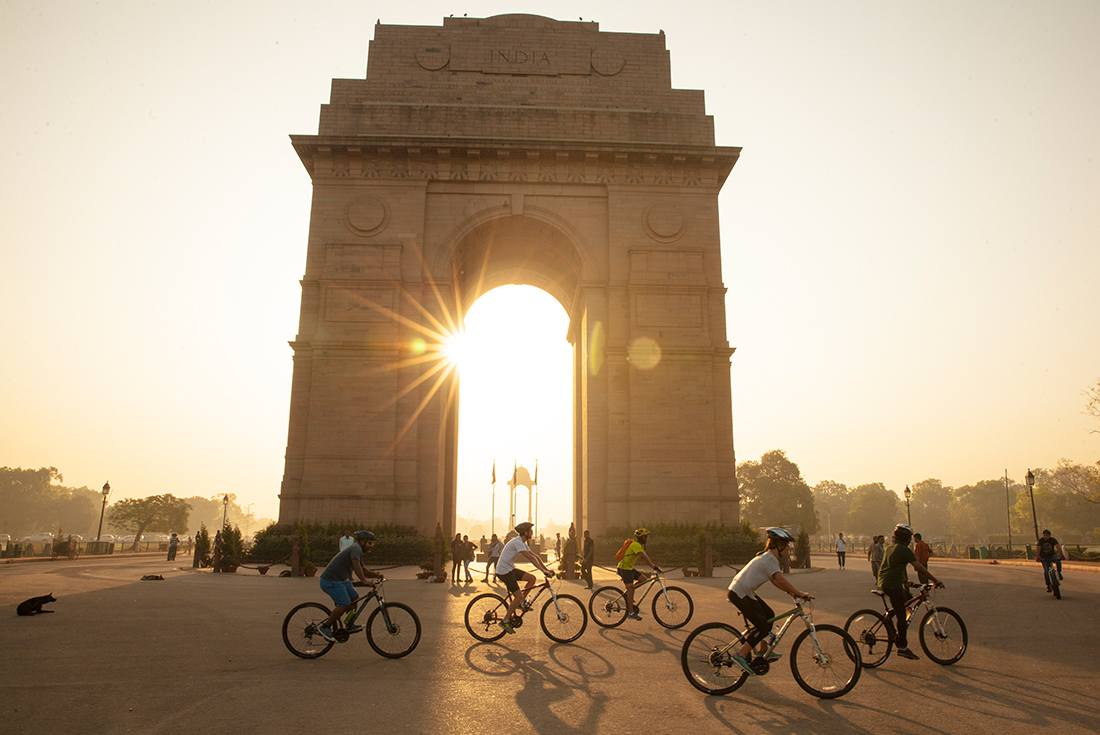
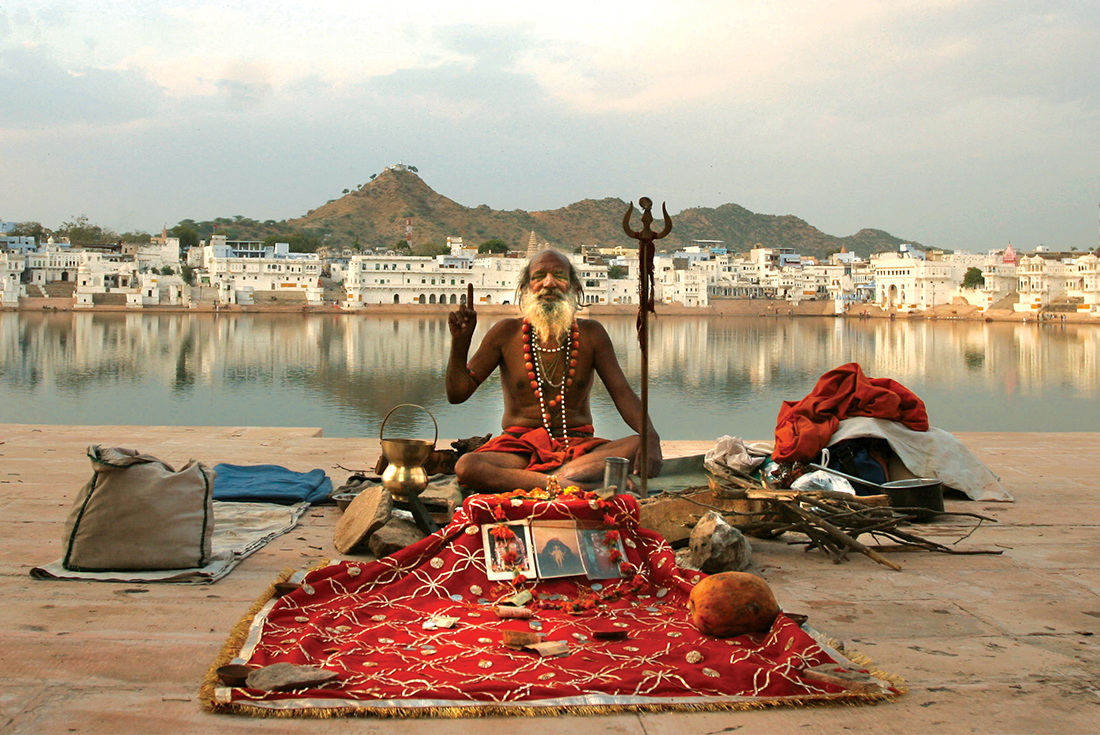
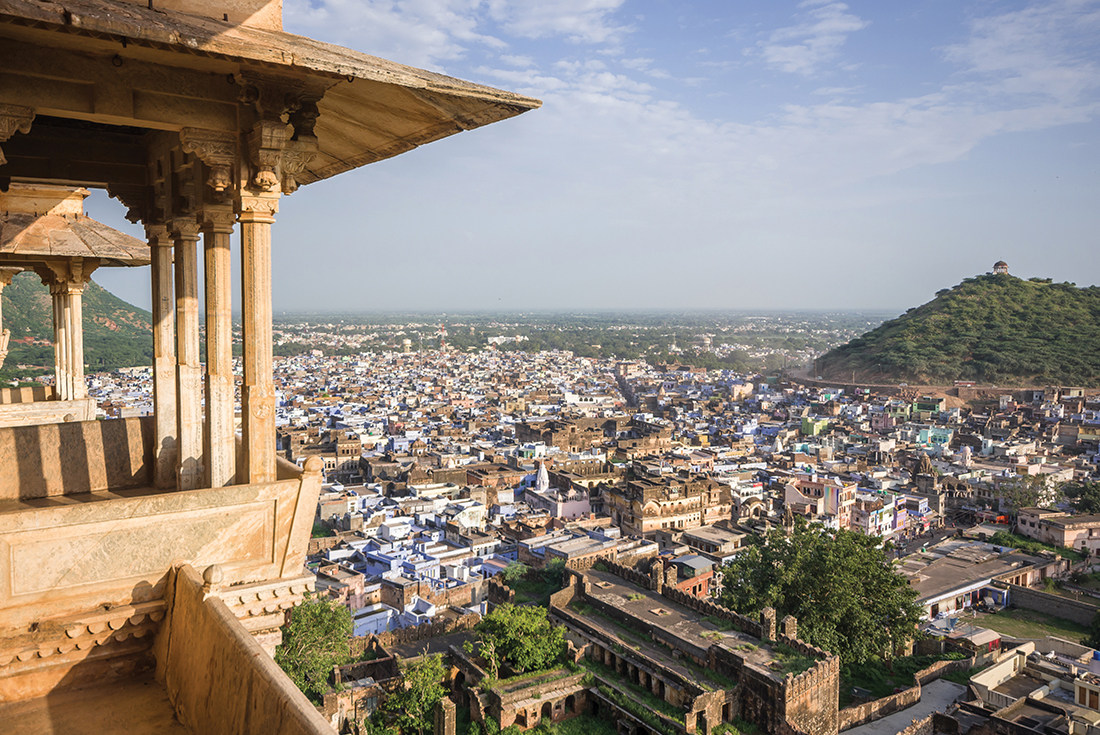
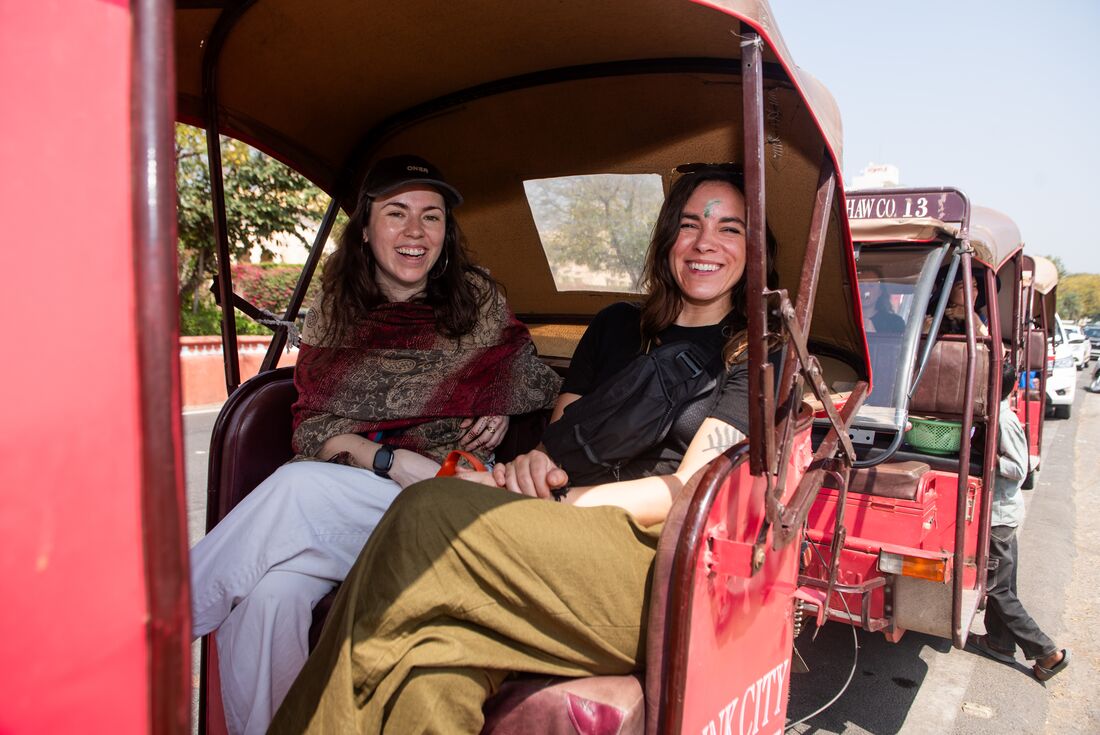
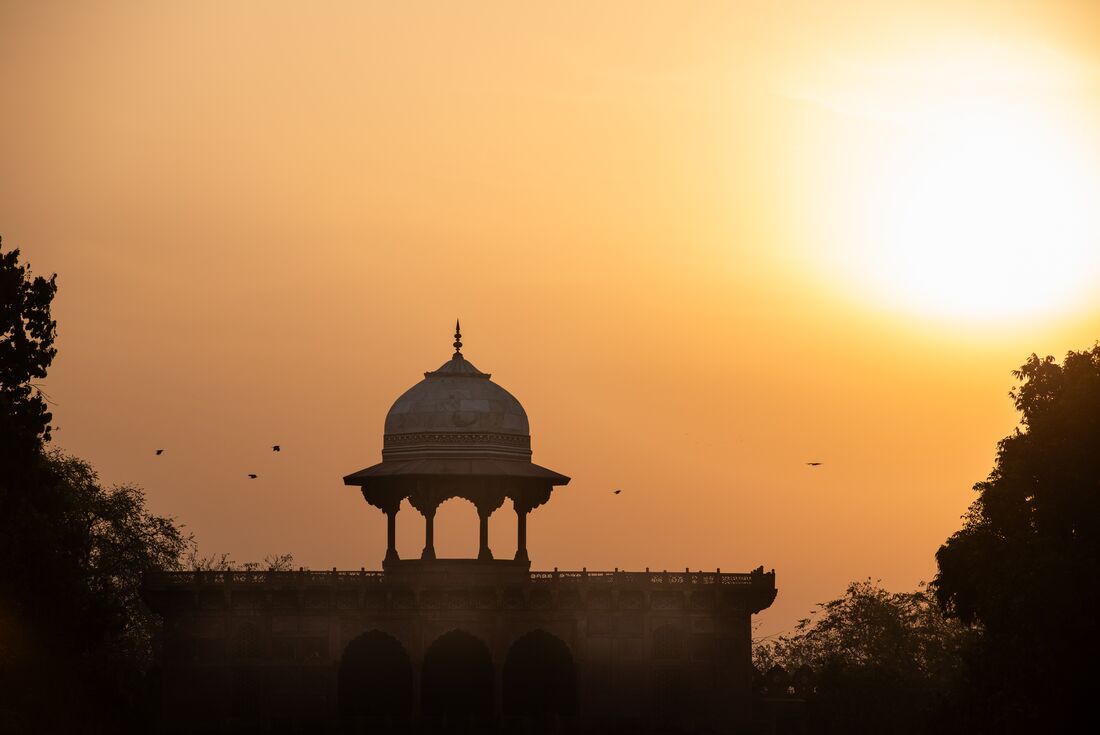
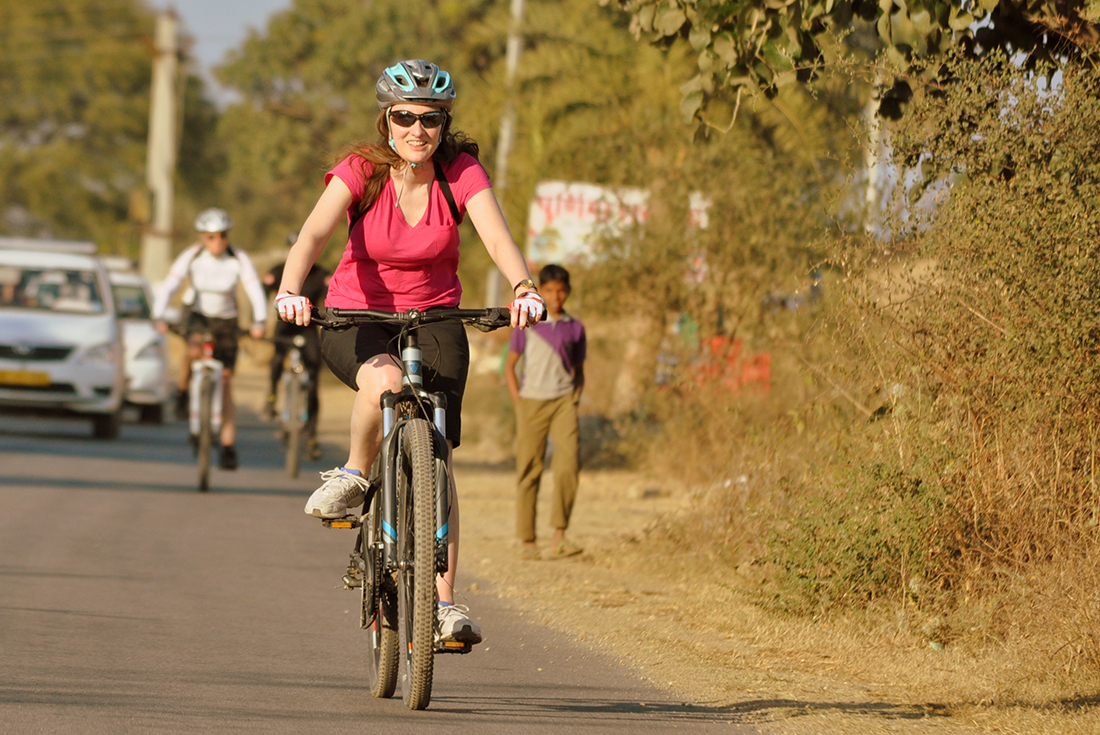
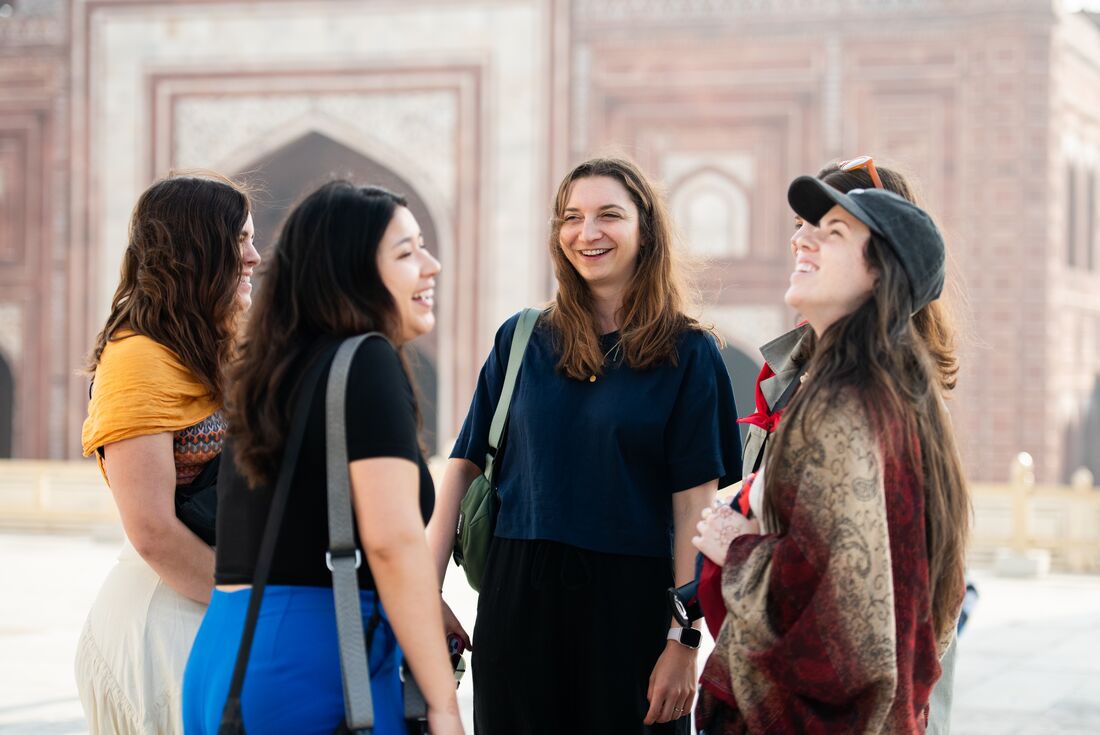
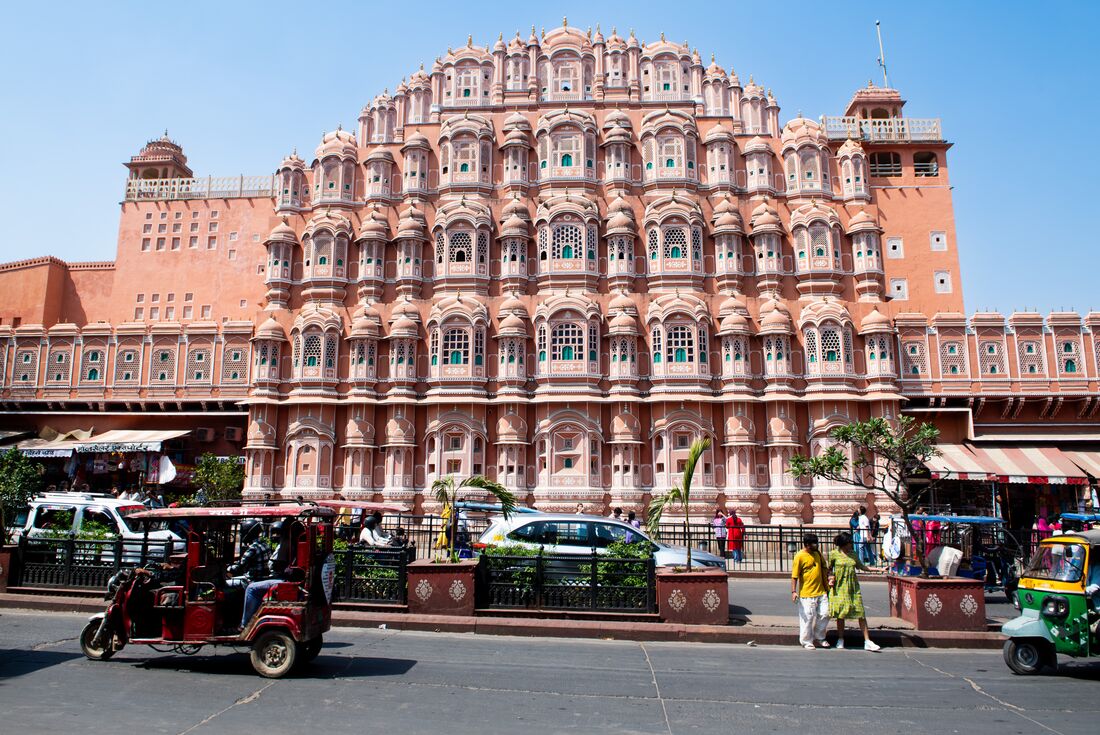
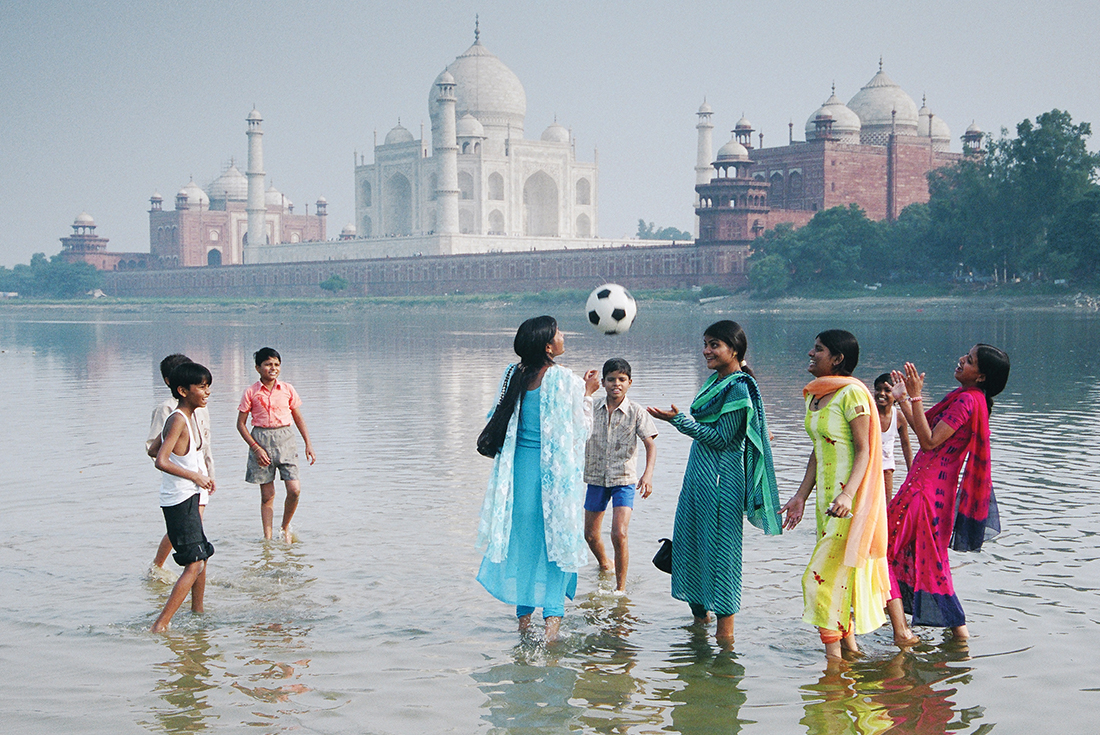
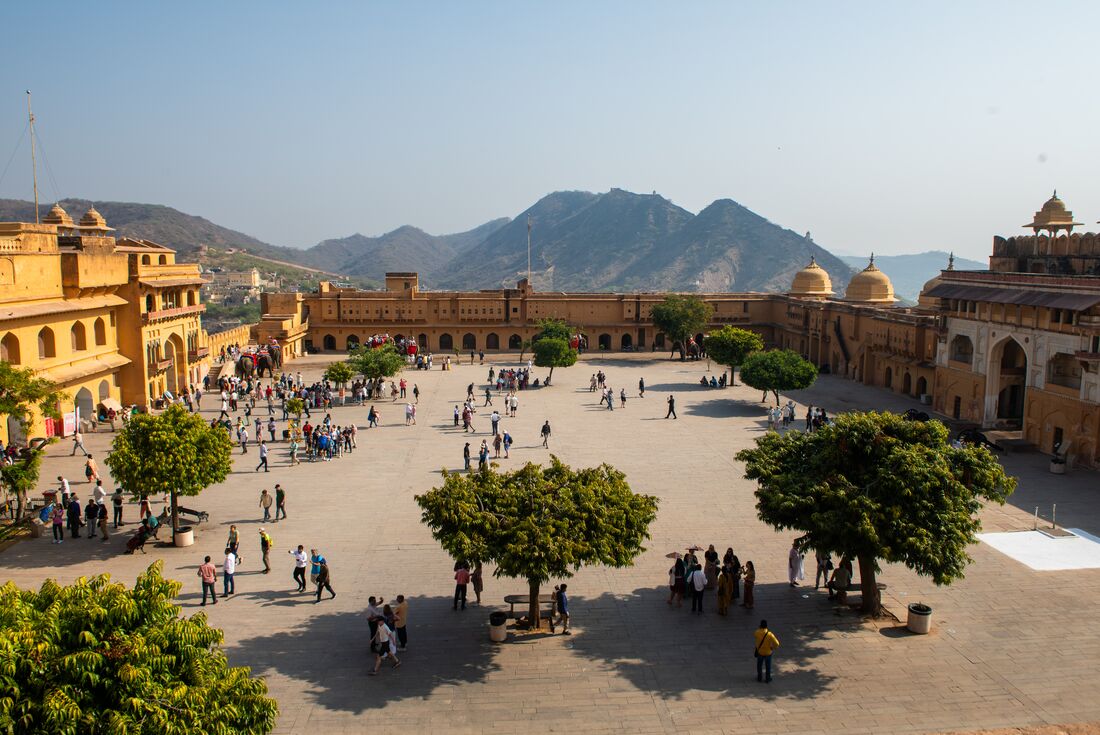
Delhi - Visit to the Jama Masjid Mosque
Delhi - Sheeshganj Gurudwara (Sikh Temple)
Delhi - Leader-led Old Delhi walking & rickshaw tour
Jaipur - Leader-led walking & market tour
Jaipur - Amber Fort
Pushkar - Leader-led walking tour
Udaipur - Leader-led walking tour
Udaipur - City Palace
Ranthambhore National Park - Morning Wildlife Safari
Madhogarh - Leader-led village walk
Agra - Taj Mahal
Agra - Agra Fort
Take the road less travelled and cycle through the rural villages and serene countryside of Rajasthan, passing old settlements, traditional architecture and authentic rural life.
Ride through India’s countryside away from the tourist track, beyond the icons and to landscapes that offer authentic glimpses into the real life of locals.
Tick the Taj Mahal off your bucket list – one of the Seven Wonders of the World, this iconic structure is also one of the most recognisable buildings on earth and is a must-see for any trip to India.
Discover the rich history and wander the amazing architecture of the Amber Fort, just outside of Jaipur, with the expertise of a local guide by your side.
Search for wildlife in the jungle of Ranthambhore National Park – the best place to see wild tigers in Rajasthan. As well as the resident striped beasts, you can also look out for leopards, wild boar, hyenas, nilgai and local birdlife.
Almondz Hotel, 4/3, Block-4, Near Metro Pillar No- 171 East Patel Nagar, Delhi, 110008, INDIA, Phone: +91 1145580000
Almondz Hotel, 4/3, Block-4, Near Metro Pillar No- 171 East Patel Nagar, Delhi, 110008, INDIA, Phone: +91 1145580000
1. It is very important that you provide your height at time of booking so we can ensure that you have the appropriate sized bicycle when your trip starts. If you do not provide your height ahead of arrival we cannot guarantee a suitably sized bike for you.
2. A Single Supplement is available on this trip, please ask your booking agent for more information.
3. Bike helmets are compulsory on this trip. We are unable to hire bike helmets locally so please ensure you bring your own bike helmet from home.
4. On this trip we have a single leader that rides with the group, and another that drives the support vehicle (acting as a back marker where needed)
5. Intrepid requires a scanned copy of your passport bio page at time of booking to secure a permit for your Ranthambore National Park visit. Authorities at Ranthambhore NP follow a strict booking process whereby permits are issued on a first come first serve basis. If we do not receive correct passport details in time we cannot guarantee you on the tiger safari.
6. During winter months (Oct-Feb), air pollution levels in parts of India can spike to hazardous levels. Severe pollution can increase the risk of respiratory problems. Those with pre-existing medical conditions, particularly heart and lung conditions, may be especially affected.
7. Please provide your full name exactly as it appears on your passport at the time of booking (including any middle names listed on your passport. Fees may apply for adding or amending details within 45 days of departure, and in some cases, you will be required to cover the cost of issuing a new ticket.
8. The possession and use of satellite communication devices without prior authorization is strictly prohibited under Indian law. This includes bike GPS computers. Bringing these devices into the country may lead to fines, confiscation of the device, immediate arrest, or even deportation for foreign nationals.
While we always endeavour to provide the best possible holiday experience, due to the nature of travel and the areas we visit sometimes things can and do go wrong. Should any issue occur while you are on your trip, it is imperative that you discuss this with your group leader or local representative straight away so that they can do their best to rectify the problem and save any potential negative impact on the rest of your trip.
We recognise that there may be times when your group leader or local representative may not be able to resolve a situation to your satisfaction - if this is the case, please ask the group leader or local representative to speak to their direct manager.
You may also choose to provide details in your online feedback, which we ask you to complete within 30 days of the end of your trip. Please do be aware that it is very difficult for us to provide any practical help after the trip is completed, so informing us while still travelling will give us the opportunity to resolve the issue in real-time., For general contact details please use the following page: https://www.intrepidtravel.com/contact-us, In case of a genuine crisis or emergency, you can reach our local office on the numbers below:
, Available for phone call or WhatsApp call on +91 999 900 5019
To complete this trip, it’s important that you’re both confident and competent in riding a bicycle., This trip covers anywhere between 25 to 90 km of cycling each day, so a reasonable level of fitness is required, although you’ll have plenty of rest breaks. A support vehicle will also be with you at all times, so if you get tired you can jump in., We visit a number of temples on this trip, which requires a certain level of modesty. Please bring clothes that cover the arms and shoulders, with pants/skirts that go past the knee. A light-scarf is also ideal for covering shoulders and arms when it’s hot.
Take the road less travelled and cycle through the rural villages and serene countryside of Rajasthan, passing old settlements, traditional architecture and authentic rural life., Ride through India’s countryside away from the tourist track, beyond the icons and to landscapes that offer authentic glimpses into the real life of locals., Tick the Taj Mahal off your bucket list – one of the Seven Wonders of the World, this iconic structure is also one of the most recognisable buildings on earth and is a must-see for any trip to India., Discover the rich history and wander the amazing architecture of the Amber Fort, just outside of Jaipur, with the expertise of a local guide by your side., Search for wildlife in the jungle of Ranthambhore National Park – the best place to see wild tigers in Rajasthan. As well as the resident striped beasts, you can also look out for leopards, wild boar, hyenas, nilgai and local birdlife.
All Intrepid cycling group trips are accompanied by one of our cycling leaders. The aim of the group leader is to take the hassle out of your travels and to help you have the best trip possible. Intrepid endeavours to provide the services of an experienced leader however, due to the seasonality of travel, rare situations may arise where your leader is new to a particular region or training other group leaders.
Our cycling leaders are all passionate cyclists, as you’d expect, but they also go through some pretty rigorous cycle-trip specific training. Each one has undergone on-road training and supervision and knows how to do safety checks, basic repairs and emergency first-aid. And at the end of the day they’re still regular Intrepid leaders, which means they will provide information on the places you are travelling through, offer suggestions for things to do and see, recommend great local eating venues and introduce you to our local friends. While not being guides in the traditional sense you can expect them to have a broad general knowledge of the places visited on the trip, including historical, cultural, religious and social aspects. At Intrepid we aim to support local guides who have specialised knowledge of the regions we visit. If you were interested in delving deeper into the local culture at a specific site or location then your leader can recommend a local guide service in most of the main destinations of your trip.
https://www.intrepidtravel.com/safety-guidelines, PETTY THEFT AND PERSONAL SAFETY
While travelling there is always the risk of pick-pocketing and petty theft, particularly in the more touristy cities. We recommend that you exercise caution when walking alone at night and encourage you to walk together and only on main, well-lit thoroughfares. Be particularly vigilant on public transport. Simple measures like carrying your day pack on your front, not hanging your bag over the back of your chair or on the floor and wearing a money belt will reduce any chance that your valuables should go missing., SEAT BELTS:
Please be aware that local laws governing transportation safety may differ from those in your home country and not all the transport which we use is able to provide seat belts., We take safety seriously on all our trips, but cycling tours deserve a few special considerations.
HELMETS:
Helmets are compulsory and we do not allow anyone to ride without one (including our own staff!). You can bring your own, or purchase one that meets international safety standards on the ground. Your leader can assist with this.
FOOTWEAR
For safety reasons we strongly recommend that you wear shoes that cover the toes while riding.
SUPPORT VEHICLES
We usually have a support vehicle following us if first-aid is ever necessary or people are feeling too tired to ride.
BIKES:
Our bikes are serviced regularly, and we get them checked by experts before each and every trip. Should you choose to bring your own please note that while we are happy to assist where we can with repairs you are responsible for the safety and suitability of your own equipment.
TRAFFIC AND DRIVING ON THE OTHER SIDE OF THE ROAD:
Depending on where you come from please note that drivers in this part of the world may drive on the opposite side of the road from what you are used to. Look both ways before crossing any road. Traffic can be a little more chaotic than you might be used to at home. Be aware!
There are times when traffic conditions make sections of our planned riding route unsafe – in this instance we will use the support vehicle.
WEATHER
Due to inclement weather posing a serious health or safety issue there may be times when we use the support vehicle instead of doing the planned ride. We will endeavour to reroute if possible but at times may have to cancel the planned ride., FESTIVALS - HOLI & DIWALI:
Travelling in India and Nepal during Holi can at times be unsafe - drinking and drug use is more widespread during this holiday. Your leader/guide will advise your group on what places to avoid on the day.
It may be necessary to alter your itinerary for the day.
Diwali (a lunar festival generally held from mid October to mid November every year) is celebrated by local people letting off fireworks in the street. It can be very noisy for several days with extra pollution caused by fireworks. As there are no restrictions on buying fireworks in India there are often injuries caused by people exploding them inappropriately.
During this festival your leader/guide may be required to alter your itinerary to avoid large crowds gathering and using fireworks.
PASSPORT
You’ll need a valid passport to travel internationally and most countries require your passport to have a minimum of 6 months validity, so remember to check the expiry date.
We need your passport information to get everything ready for your trip so it’s important that the information on your booking matches your passport exactly. Please take care to provide the correct details. We recommend carrying a copy of the photo page of your passport while travelling and leaving a copy at home with family or friends.
VISAS & ENTRY REQUIREMENTS
Many countries require a visa and obtaining the correct visa for your trip and any countries you may transit through is your responsibility. We recommend you check your visa requirements as soon as you have booked your trip. This will ensure you have time to prepare your documents and for your visa application to be processed. You can check the entry requirements for your nationality on your government's foreign travel advisories, consular websites or on our page here: www.intrepidtravel.com/visa-entry-requirements, NATIONAL PARKS:
In order to obtain permits and safari bookings for national parks in India, we require a scanned colour copy of the bio page of your passport at the time of booking. Your safari arrangements cannot be completed without this information.
, ADDRESS FOR VISA APPLICATIONS:
If you require an address for Visa Applications in India, please use:
Intrepid India
25/3 East Patel Nagar
Delhi 110008
Phone: +91 11 4500 6400
Information not available.
Validity: 01 Jan 2026 to 31 Dec 2026
GENERAL HEALTH
All travellers need to be in good physical health in order to participate fully on this trip. For the safety and wellbeing of yourself and others, if you are unwell prior to travelling, please stay at home and contact us to make alternative arrangements.
When selecting your trip please make sure you have read through the itinerary carefully and assess your ability to manage and enjoy our style of travel. Please note that if in the assessment of our group leader or local representative a traveller is unable to complete the itinerary without undue risk to themselves and/or the rest of the group, we reserve the right to exclude them from all or part of a trip without refund.
You should consult your doctor for up-to-date medical travel information or for any necessary vaccinations before departure. We recommend that you carry a first aid kit as well as any personal medical requirements in their original packaging as they may not easily be obtained while travelling. If you are carrying medication, ensure you check your government's foreign travel advice for any local restrictions or requirements.
, CYCLING HEALTH
Riding across unfamiliar terrain in weather conditions that you are not used to can potentially lead to cycling-related health issues. The most common of which is dehydration. While this arises most frequently on warm/hot days, it is also a factor during cold weather as you continue to sweat. Research shows that most riders will typically lose 500-1000 ml of water per hour. While we schedule in frequent rest stops and encourage you to refill water bottles at every opportunity, it is the responsibility of each cyclist to monitor their own levels of hydration. The key point to remember is not to wait until you’re thirsty, but to drink small amounts regularly from the start of your ride. Adding an electrolyte solution can aid in replenishing the salts/electrolytes lost through physical activity. , MOSQUITO-BORNE ILLNESSES:
Malaria is a risk in many parts of India, including major cities. Cases of dengue fever are reported, especially in the period after the monsoon. Other mosquito-borne diseases (including Japanese encephalitis, chikungunya fever, and filariasis) also occur. Take preventative measures such as wearing long clothing, using repellent, and being indoors particularly around dusk and dawn. Consult a medical professional regarding prophylaxis against malaria. For more information, see the World Health Organisation's fact sheets: http://www.who.int/neglected_diseases/vector_ecology/mosquito-borne-diseases/en/
AIR POLLUTION:
During winter months (October-February), air pollution levels in parts of India can spike to hazardous levels. Severe pollution can increase the risk of respiratory problems. Those with pre-existing medical conditions, particularly heart and lung conditions, may be especially affected. Your group leader or local representative can assist you to obtain a face mask if required. All customers are encouraged to pack (reusable) face masks as a precaution.
OTHER INFECTIOUS DISEASES:
Water-borne, food-borne, parasitic and other infectious diseases (including meningitis, cholera, typhoid, hepatitis, tuberculosis, diphtheria and rabies) are common in India. Tap water is not safe to drink. Home-made or unlabelled alcohol can be poisonous. Seek medical attention if you suspect food poisoning, if you have a fever or suffer from diarrhea.
ZIKA VIRUS:
India is classified as an ongoing transmission zone for Zika, with confirmed cases in Tamil Nadu and Jaipur. Basic precautions for protection from mosquito bites should be taken by people traveling to Zika transmission areas, especially pregnant women.
INFLUENZA
Cases of influenza A(H1N1) are widespread in India during winter with a number of recent cases in Rajasthan. Discuss influenza vaccination requirements with your doctor or a travel health professional before departing and maintain good hygiene practices by covering your mouth and nose with a tissue when coughing, and washing your hands regularly. For more information, see the World Health Organisation's fact sheets: https://www.who.int/news-room/fact-sheets/detail/influenza-(seasonal)
While travelling with us you'll experience the vast array of wonderful food available in the world. Your group leader or local representative will be able to suggest restaurants to try during your trip. To give you the maximum flexibility in deciding where, what and with whom to eat, generally not all meals are included in the trip price. This also gives you more budgeting flexibility. As a rule, our groups tend to eat together to enable you to taste a larger variety of dishes and enjoy each other's company. If you have dietary requirements and/or food allergies, please let your booking agent know prior to departure.
SPENDING MONEY
When it comes to spending money on the trip, every traveller is a little different. You know your spending habits better than we do, so please budget an appropriate amount for things like optional meals, drinks, shopping, optional activities, and laundry. Make sure you have read the itinerary and inclusions thoroughly so you know what is included in the trip price and what you may need to pay for while travelling. , INDIA
The official currency of India is the Indian Rupee (INR). Its symbol is ₹. ATMs that accept international debit and credit cards are widely available in larger cities and towns. Cash shortages at ATMs can be a problem in rural areas. The use of credit cards can be restricted, mainly to major hotels, shops and restaurants. Make sure you carry sufficient cash to cover your needs when travelling outside larger cities and towns.
INR is a blocked currency, which means it can only be obtained in India and cannot be exchanged outside India. Ensure you use or exchange all INR before leaving the country.
, TIPPING
Tipping can be an appropriate way to recognise great service when travelling. While it may not be customary in your home country, it is an entrenched feature of the tourism industry across many of our destinations and is greatly appreciated by the people who take care of you during your travels. It is always best to avoid tipping with coins, very small denomination notes, or dirty and ripped notes, as this can be regarded as an insult rather than the goodwill gesture it is intended to be., OPTIONAL TIPPING KITTY
On Day 1 of your trip, your group leader or local representative may discuss with you the idea of operating a group tipping kitty, whereby everybody contributes an equal amount and your group leader or local representative distributes tips for drivers, local guides, hotel staff and other services included on your trip. Participation in this kitty is your choice, and you are welcome to manage your own tipping separately if you prefer.
The group leader or local representative will keep a running record of all monies spent, which can be checked at any time. Any funds remaining at the end of the trip will be returned to group members. These tips to suppliers are for great service and are in addition to the regular costs paid for the services supplied.
The tipping kitty excludes tips for your group leader or local representative, and providers of optional activities., Optional tipping kitty for this trip: INR 5500 per person., YOUR GROUP LEADER OR LOCAL REPRESENTATIVE
Tipping your group leader or local representative is highly appreciated if you feel they’ve provided outstanding services throughout your trip. The amount is entirely a personal preference; however, as a guideline, the recommended amount is 4-7 USD or EUR per traveller per day (in a currency relevant to your destination). Of course, you are free to tip more or less as you see fit, depending on your perception of service quality and the length and involvement of your group leader or local representative on your trip., CONTINGENCY FUNDS
We try to plan for every eventuality, but there are still some things beyond our control. We reserve the right to change an itinerary after departure due to local circumstances or a Force Majeure Event. In such emergency circumstances, the additional cost of any necessary itinerary alterations will be covered by you. Please note we are not responsible for any incidental expenses that may be incurred as a result of the change of itineraries including but not limited to visas, vaccinations or non-refundable flights. Make sure you have access to an extra US$500 for emergencies (e.g. severe weather, natural disasters, civil unrest) or other events that result in unavoidable changes to the itinerary (e.g. transport strikes or cancellations, airport closures). Sometimes these things necessitate last-minute changes to enable our trips to continue to run, and as a result, there may be some extra costs involved. The recommended amount is listed in USD for the relatability of universal travellers, however, local currency may be needed once in the country to cover these costs., COMMISSIONS
Intrepid understands that the receipt of commissions in exchange for recommending particular shops or services is ingrained in the culture of the tourism industry. For this reason, we have established a centralised fund for contributions from recommended suppliers so these can be collected and distributed back into the business. Actively managing the receipt of commissions helps us maintain the level of quality you expect on one of our trips. Travel is always an adventure so Intrepid cannot explicitly guarantee the quality of a product but we aim to provide the best value trips in the market. Please let us know via the feedback form completed after your trip if we are successfully meeting - or exceeding - this objective.
Most travellers prefer to take a small to medium wheeled suitcase, which is a great size for the packing capacity in our private vehicles. Whatever you take, be mindful that you will need to be able to carry your own luggage, handle it at airports, take it in/out of accommodation and perhaps even walk short distances. We recommend you pack as lightly as possible.
If your trip includes travelling on overnight trains or primarily using public transport, the smaller your luggage, the easier it will be to store under or above bunks. Large suitcases may not be able to be taken on board. A lockable bag or small padlock for your bag will be useful, especially when travelling on public transportation as well.
When you're exploring during the day, you'll also need a day pack/bag to carry water, a camera, a jacket and activity-specific items like a swimsuit, a waterproof pouch/bag for your phone, or hiking shoes.
Below we have listed the essentials for this trip:, https://www.intrepidtravel.com/packing-list, The possession and use of satellite communication devices without prior authorization is strictly prohibited under Indian law. This includes bike GPS computers. Bringing these devices into the country may lead to fines, confiscation of the device, immediate arrest, or even deportation for foreign nationals., IMAGES FROM HOME
During our trip, there will be many opportunities for you to meet and talk with locals. One way to start any conversation is with pictures. We recommend that you bring some photos/postcards of your family, home, city or country where you live, animals peculiar to your country, etc., CYCLING
Packing for a cycling tour isn’t that different from any other adventure, but if you want to be comfortable and warm, here are a few bike-specific requirements and suggestions:
• Main piece of luggage – as space in our support vehicle/transport can be limited we request that you bring only a small bag as your main piece of luggage. We recommend a soft-sided bag
• Helmet – these are compulsory, but if you don’t have your own you can often purchase an approved and well-fitted one at the start of the trip (our leaders can assist you with this). There are some destinations where you are unable to purchase appropriate helmets locally so you will always need to bring your own - please check the 'Important Notes' section to see if this is the case.
• Padded bike shorts
• Quick-dry jerseys – you can get away with a few cotton t-shirts but having a few light and breathable jerseys will make your cycling a lot more comfortable, especially in warmer/humid climates.
• Quick-dry socks
• Cycling gloves / Regular gloves – not essential but recommended as padded cycling gloves will make your riding more comfortable and can help protect you in the case of a fall. Regular gloves for those who may not own cycling gloves to keep hands warm in cold wet weather.
• Rain gear – pack a light poncho in case the weather turns when you’re out on the road.
• Light breathable waterproof/windproof outer layers – especially useful for those early mornings or downhill sections when wind-chill becomes a factor.
• Water bottle – we don't provide bottles, but all our bikes have one bottle holder fitted (and a second one can be fitted if required). Please bring a cycling-specific water bottle as other types will fall out of the holders. A Camelbak will make drinking on-the-go easier.
• Sunglasses – well-fitted sports sunglasses help protect against dust, insects and the sun.
• Day pack – our support vehicle will carry your main piece of luggage, but a day pack for snacks and clothes is a good idea.
• Sunscreen – please bring a high protection factor (e.g. SPF50) sunscreen as long days in the saddle mean long exposure to the sun.
• Shoes – normal sports shoes can be worn on all our trips however you may want to consider a flat shoe with a relatively stiff sole as it makes pedalling a lot more efficient. Regular cyclists are welcome to bring their own cycling-specific shoes however we recommend 'mountain bike' style shoes that have grip on the sole rather than ‘road bike' shoes as you will still be walking around while on the rides (cafe/photo/toilet stops, etc). For safety reasons we require that you wear shoes that completely cover the toes while riding.
• Saddles – Our saddles are standard, unisex models –less experienced cyclists may choose to bring your own gel seat cover for added comfort.
• Pedals – all bikes come with flat pedals. Regular cyclists are welcome to bring their own pedals – our leader will assist in fitting them to your bike.
• Bike Lights - we design our Cycling trips so that you are usually riding during daylight hours so do not include bike lights unless a night ride is specifically planned and included in the itinerary. Should you feel more comfortable riding with 'daytime' flights please bring your own and we will be happy to assist in fitting them to your included bicycle.
, India is a naturally conservative country, and as such we recommend all cyclists wearing baggy short over their lycra cycling shorts. We also recommend bringing a buff that you can put over your mouth for when it is dusty or the smog levels are higher than normal., WARM CLOTHING:
It comes as a surprise to many travelers that India can be cold (ie. below zero!) during winter (particularly Dec/Jan), even in some cities and even when not at high altitudes. Make sure you are prepared for the weather during these months by bringing adequately warm clothes with you, including thermal underclothes and an appropriate jacket. Many hotels in India do not have central heating, so a warmer set of clothes to sleep in has also been recommended by our past travelers.
WEATHER IN INDIA
Due to India's size and topography, there's a huge amount of variation in its climate. We recommend you consider both the season and the part of India you intend to visit, so that you can best pack for your adventure.
For much of the country, a good time to visit India is from September to March with warm days and cool nights.
During winter (December to January), temperatures can get quite cold in Delhi and the north, especially at night. Hotels in some regions may not have adequate heating. In these months you may like to bring thermals for sleeping and a warm jacket for mornings and evenings. Fog can delay trains travelling throughout this region.
Monsoon is from May to October and offers hot and humid conditions. It is not unusual for trains to be delayed, and for activities in towns near rivers and lakes (ie Varanasi) to require amendment at this time of year. Your group leader or local representative will be able to advise you locally on any changes.
During Summer (June to September), temperatures can get extremely hot in Delhi and the north. Itineraries may be amended to avoid the hottest parts of the day. Your group leader or local representative will be able to advise you locally on any changes., RANTHAMBHORE NATIONAL PARK
In 2015 Intrepid returned to Ranthambhore National Park after suspending our visits in 2014 due to vehicle safety concerns. The majority of vehicles have now been assessed and upgraded. Safety of our travellers is our highest concern and your tour leader has the authority to cancel or reschedule the jeep safari if they believe that vehicles available do not meet our safety expectations.
Intrepid won't tolerate any kind of violence, harassment (whether physical, verbal or sexual), or disrespect toward fellow travellers, our teams or local communities.
To ensure the wellbeing of everyone on the trip, decisions made by your group leader are final.
Romantic relationships between travellers and group leader or local representative are not permitted while on trip.
Any behaviour that prevents your leader from continuing the itinerary as planned, breaks local laws or opposes any of these guidelines may result in Intrepid denying your booking or removing you from the trip.
If something concerns you during your travels, please speak to your group leader immediately. Alternatively, you can contact us on the emergency contact number detailed in the Problems and Emergency Contact Information section of this Essential Trip Information. , While we do accept children under 18 on this trip we do have a couple of rules. From a safety and enjoyment perspective they should be confident and competent cyclists capable of completing the riding part of the itinerary without additional assistance. Minors under 18 years old must always be accompanied by a parent/legal guardian. This includes when the minor rides in the support vehicle.
The style of accommodation indicated in the day-to-day itinerary is a guideline only and may change. On some occasions, alternative arrangements may need to be made due to the lack of availability of rooms in our preferred accommodation. In these cases, we will use a similar standard of accommodation.
Throughout the trip, we request that our properties prepare rooms in time for our arrival, especially if we're arriving prior to normal check-in time. However, this isn't always possible which means we won't be able to check-in immediately on arrival at some hotels. Instead, we can store our luggage and explore our new destination or on some trips, have use of shared day rooms until all rooms are available.
, ACCOMMODATION:
Some of the accommodation along the way is basic or simple, staying in local guesthouses and homestays. Some may have shared bathroom facilities with cold water only. We use a mixture of air-conditioned and non-air-conditioned rooms. Some areas of India experience daily load shedding. This is where the power may be turned off at certain times of the day and usually occurs for a few hours in the early afternoon. Most hotel properties have a restaurant or cafe serving local meals. Many restaurants and hotels do not serve alcohol for religious reasons or due to local laws.
SHOWERS:
Showers at some hotels only have hot water at peak times (usually morning and evening). Outside of these times, you may need to speak to reception to obtain hot water.
ROOM ISSUES:
If you have any issues with your room, please speak to the hotel and your tour leader right away rather than your travel agent so that the problem can be addressed without delay., The periods of November to mid-December and mid-January to July, are commonly referred to as the 'Wedding Season' in India. This at times leads to very late changes to our scheduled accommodation, or even at times the actual location (City/town/village) we planned to stay at. While we endeavour to minimise any disruptions to our itinerary there will be occassions we are forced to change locations without notice.
While there are occasions when we use local public transport such as trains, buses or taxis to cover long distances or attend non-cycling activities, we predominantly use the bicycle as our main form of transport. On most of our trips we also have a support vehicle as secondary transport for travelling longer distances, avoiding hazardous areas to cycle, as a backup should we have any incidents and of course as an option for those that would prefer not to cycle for an hour or a day. In most regions, the support vehicle will be a minivan, but may range in size up to a full-sized coach or overland vehicle. Your main piece of luggage is transported in the support vehicle. Our bikes do not have panniers or bags on them, so we recommend a small backpack or a cycling jersey with rear pockets to carry any essentials you’ll need with you., OUR BIKES - INDIA
We use Trek X caliber 5 & 6 models (29” wheels) bikes on this trip. These bikes are mountain bike-style with flat bars, front suspension and 27 gears. For more specific information and sizing please see http://archive.trekbikes.com/us/en/2015/Trek/x_caliber_6#/us/en/2015/Trek/x_caliber_6/details, BRINGING YOUR OWN BIKE
While we’re confident in the quality and suitability of the bikes we include, we do recognise that sometimes you just need the comfort of your own bike to enjoy the ride. If you are thinking of bringing your own bike on this trip, please advise us at time of booking and take note of the below information. If you do choose to bring your own bike, please note that we will not being carrying a spare bike for you.
SUITABLE TYPE OF BIKE
Although the surfaces of the roads we travel on are generally good there are occasionally gravel or potholed sections of road/track. As such, we recommend a 'mountain' or 'hybrid' style bike with plenty of gear selections for easy cruising. For more details on the type of roads we’ll be riding on see the ‘Physical Rating’ section of your Essential Trip Information. Please contact your booking agent if you have any questions about the suitability of your bike.
We usually cannot accept tandem bikes on our trips as they are often too large for our transport. In some destinations we can make an exception. Please ask your booking agent if you are interested in bringing a tandem bike.
BEFORE THE TRIP
We recommend that you have a full service of your bike performed by a trained mechanic to help minimise any issues you may have during the trip. Please also ensure that you have specific and adequate cover for loss, damage or theft for your bike under your travel, home and contents or specialist insurance policy.
DURING THE TRIP
Your bike will be transported in the same way as our included bikes, usually in the support vehicle or on the bike trailer. While we endeavour to take the best care we can, you should recognise that transported bikes do get the occasional bump or scratch along the way. The same applies when we take other forms of transport, such as a train, where we are unable to pack the bikes ourselves. Your bike will be secured in the same way as our included bikes. This can occasionally be outside the vehicle (where the bikes are locked together).
In order to reach our destination, it is necessary for us to travel via various modes of transportation, including planes and trains. Any extra costs involved with transporting personal bikes are your responsibility. This includes (but is not limited to) additional transport costs and customs/import fees.
While our mechanics can usually assist with minor repairs, you are responsible for the safety and upkeep of your own bicycle. This includes conducting regular safety checks of your bike during the trip and cleaning your bike. In addition, any parts that require replacing are your responsibility. Most destinations have access to only limited spares along the way and access to bike shops can be days apart. Therefore, please ensure you bring any spare parts that you may require (especially specialist parts).
TRANSPORTING YOUR BIKE TO/FROM THE DESTINATION
Your preferred airline should have no problem carrying your bike, but many will charge an extra fee. Contact them before departing to discuss their arrangements for transporting bikes.
A well-padded bike box (obtainable from a bike shop) is usually the best method of plane transportation. We recommend that you accompany your bicycle on the flight. Unaccompanied bicycles have been known to spend some extra days in the hands of customs authorities.
Many taxis are not large enough to transport a bike box/bag so you may be delayed waiting for a suitably sized vehicle.
The possession and use of satellite communication devices without prior authorization is strictly prohibited under Indian law. This includes bike GPS computers. Bringing these devices into the country may lead to fines, confiscation of the device, immediate arrest, or even deportation for foreign nationals.
INCLUDED OR HIRE BIKES: CONDITIONS OF USE
You must not mistreat the bicycle and must return it in the same condition as when you received it (excepting ordinary wear and tear). You should immediately inform the supplier in the case of breakdown or loss. The provider is entitled to charge for any damage caused to the bicycle during the period of hire. You must also make sure that the bicycle is secured when not in use. If the equipment is lost or stolen you may be liable for the replacement value of the bicycle. The bicycle remains the property of the supplier and you may not sell, rent out or part possession with the bicycle. You must not use the bicycle while under the influence of alcohol or drugs.
Travel insurance is compulsory on all our trips for those travelling internationally. We require that, at a minimum, you are covered for medical expenses, including emergency repatriation. If you are travelling within your home country or region, please confirm before travel that you are entitled to access the public medical system easily should an accident occur. We strongly recommend all travellers have a policy that also covers personal liability, cancellation, curtailment and loss of luggage or personal effects. For international trips, you will not be permitted to join the group until evidence of travel insurance and the insurance company's 24-hour emergency contact number has been sighted by your group leader or local representative.
If you have credit card insurance, your group leader or local representative will require details of the participating insurer/underwriter, the level of coverage, policy number, and emergency contact number, rather than the bank's name and your credit card details. Please contact your bank for these details prior to arriving in-country.
For travellers who reside within the European Union, Switzerland or the USA, the requirement to purchase travel insurance cannot be compulsory. However, the purchase of travel insurance is still highly recommended, and each country you visit may have its own specific entry requirements. For example, some mandate travel health insurance for all foreign travellers, regardless of their nationality. Travellers from the European Union, Switzerland or the USA who decline travel insurance when travelling outside their home region must sign a Travel Insurance Waiver Form at the Group Meeting, recognizing personal responsibility for emergency medical and repatriation costs should they arise.
For assistance with travel insurance or other services, please visit the link below:
, https://www.intrepidtravel.com/booking-resources/our-services
As you travel on a group trip you will be exposed to all the pleasures and maybe some of the frustrations of travelling in a group. Your fellow travellers will probably come from all corners of the world and likely a range of age groups too. We ask you to be understanding of the various needs and preferences of your group - patience with your fellow travellers is sometimes required for the benefit of everyone's travel experience. Remember too that you have responsibilities to the group. If you are requested to be at a place at a certain time, ensure that you don't keep the rest of the group waiting. We have found time and time again that the very best trips we operate are those where the dynamics within the group work well - this takes just a little effort on your part. Due to privacy reasons, we are unable to provide you with contact details and any personal information about your fellow travellers booked on your trip prior to departure., SOLO TRAVELLERS
On our trips, rooming is organised on a twin-share basis. We pair up solo travellers with another traveller of the same gender, as per the gender marker on each of their passports.
We also offer an optional single supplement on most trips for travellers who prefer to have their own room. This only applies to accommodation during the tour. Pre-trip and post-trip accommodation booked through us will always be on a single-room basis.
On a small selection of trips some accommodation will be open-gender and multishare, such as a felucca in Egypt or an overnight train in Vietnam. Please review the Accommodation section of the Essential Trip Information for details about your trip.
LGBTQIA+ TRAVELLERS
We strive to create a safe and inclusive environment for everyone. If your gender identity differs from what is indicated on your passport, please contact us so that we can discuss rooming options with you., A single supplement is available on this trip.
ITINERARY CHANGES
Our itineraries are updated regularly throughout the year based on customer feedback and to reflect the current situation in each destination. The information included in this Essential Trip Information may therefore differ from when you first booked your trip. It's important that you review this information prior to travel so that you have the latest updates. Due to weather, local conditions, transport schedules, public holidays, political unrest or other factors, further changes may be necessary to your itinerary once in-country. Your group leader or local representative will keep you up to date with any such changes once your trip is underway and has the authority to amend or cancel any part of the trip itinerary if deemed necessary due to safety concerns.
, OPTIONAL ACTIVITIES
A selection of optional activities that have been popular with past travellers are listed in the day-to-day itinerary. This isn't an exhaustive list and should be used as a guide only for some of what might be available. Prices are approximate, are for entrance fees only, and don’t include transport to and from the sites or local guides unless indicated. All activities are subject to availability, and maybe on a join-in basis. It may not be possible to do all the activities listed in the time available at each destination, so some pre-planning for what you are most interested in is advised. When it's recommended that travellers pre-book these activities, look for a note in the Special Information section of the day-to-day itinerary. For most, they can either be organised independently on the day, or let your group leader or local representative know you are interested at the Welcome Meeting and they can assist.
Where activities are considered medium or high risk, we work with operators whose safety and credentials we have sighted and assessed. Although it is possible that you may find the same activity cheaper with another operator on the ground, we cannot vouch for the safety or quality of that operator. Medium and high-risk activities not listed above have not been assessed by us and as such our staff and group leader or local representative are unable to assist you with organising these activities. Activities that contravene our Responsible Travel policies are also not listed. Please remember that the decision to partake in any activity not listed is at your own discretion and risk.